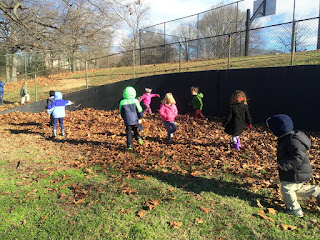This is a Tuesday Slice of Life for Two Writing Teachers.
Check out their website for many more reflections on teaching.
_________
_________
"If you want your child to learn to take his dishes to the sink after eating,
you have to expect him to drop the plate, spill the milk, and slop the food, first."
Not sure this is the precise quote.
Not even sure who provided me this wisdom.
However, I find it profound.
This is how one becomes more competent - by making mistakes. I know this.
For me, it is the trickiest part of being a lead teacher, working alongside a beginning teacher. Mid-year, under our "gradual release" plan, my beginning teacher is taking the lead almost two full days a week - leading the children to and from the classroom, reading books aloud, planning centers activities and small groups, resolving children's conflicts, and more.
I am stepping back, as best I can,
reminding myself that
she's going to drop the plate,
and that's okay.
Think of all the 'rookie' mistakes we do as beginning teachers, learning to lead a class:
- doggedly follow lesson plans rather than shifting to meet what the student needs;
- under-plan lessons, and unsure what to do to fill the bonus time that remains;
- take a bathroom break even though a small crisis is brewing in the classroom;
- gather materials for a lesson after the lesson has begun;
- begin reading a book before all the children are paying attention;
- become focused on one child at the expense of many others;
- lead lines down the hall and to the playground, oblivious to what is happening at the end of the line;
- talk at students rather than converse with students;
- miss opportunities to instigate children's engagement;
- unable or uncertain as to how to move away from one part of room in order to meet some unexpected need in another part of the room;
- solve children's conflicts for them rather than coach the children to listen to one another and resolve the issue themselves;
- become hyper-focused on all the negative behaviors that children are doing;
- get defensive when more is expected, because it feels as if you are already doing so much.
it is essential to see each of these (and many more) as the 'rookie' mistakes that they are,
with no malevolence intended.
I spend a lot of time trying to identify those 'chunks' that went well, to help her build on these. I remind myself that she simply cannot see the full picture yet, and, in time, she will.
It is important to let go, let mistakes happen, watch things fall apart, and trust that they can be put back together again.
"I see you tried....next, you will...."
It is a work in progress.
I spend a lot of time trying to identify those 'chunks' that went well, to help her build on these. I remind myself that she simply cannot see the full picture yet, and, in time, she will.
It is important to let go, let mistakes happen, watch things fall apart, and trust that they can be put back together again.
It would definitely be easier to do it myself - but that is not the point, is it?
This is a huge challenge for me, staying patient as I coach the beginning teacher through these teachable moments. I want to be the calm voice that says,
It is a work in progress.








